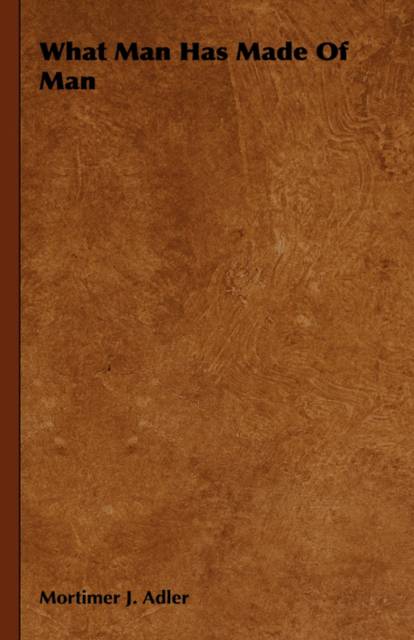
- Retrait gratuit dans votre magasin Club
- 7.000.000 titres dans notre catalogue
- Payer en toute sécurité
- Toujours un magasin près de chez vous
- Retrait gratuit dans votre magasin Club
- 7.000.000 titres dans notre catalogue
- Payer en toute sécurité
- Toujours un magasin près de chez vous
Description
What Man Has Made of Man. CONTENTS: INTRODUCTION ix AUTHORS PREFACE xvii LECTURE i. THE CONCEPTION OF SCIENCE IN THE MODERN WORLD 3 LECTURE 2. THE POSITION OF PSYCHOLOGY IN PHILOSOPHY AND AMONG THE NATURAL SCIENCES 31 LECTURE 3. THE HISTORY OF PSYCHOLOGY 61 LECTURE 4. PSYCHOANALYSIS AS PSYCHOLOGY 94 SUPPLEMENTARY NOTES 124 EPILOGUE 235 LIST OF PRINCIPAL NOTES 245 vu INTRODUCTION BY DR. FRANZ ALEXANDER. IT is unusual to write an introduction to a book of an author whose conclusions, approach to his problems and whole outlook are diametrically opposite to those of the author of the introduction. Why did I then accept Mr. Adlers suggestion to write an intro duction to his book and why did Mr. Adler ask me to do so, are both questions which require an explanation. The circumstances under which these four lectures originated will elucidate this para dox. Engaged in psychoanalytic teaching and clinical studies for a long period of time, I gradually came to the conviction that in this field as in others where students are using a highly standardized technical procedure and are mainly absorbed in minute observa tion of facts, briefly in all preeminently empirical fields, the stu dents are apt to lose perspective towards their own work. This conviction goes back to those early days that I spent as a research worker in physiology in an experimental laboratory. There, I became first acquainted with the characteristic mentality of mod ern scientific research. There I learned the mores and virtues of modern research and first recognized the danger which con fronts the scientific worker of the present day. This danger is not restricted to scientific laboratories, it is a general problem of the present age. Man, the inventor of the machine, has become the slave of the machine, and the scientist, in developing highly refined methods of investigation, has become not the master but the slave of his laboratory equipment. An extreme amount of specializa tion of interest and mechanization of activity has taken place and a scotoma for essentials has developed a naive belief in the magic omnipotence of specific technical procedures leads to a routine, often sterile submersion in details without interest in or under standing of larger connections. It is no exaggeration to say that in many scientific centers not the interest in certain fundamental problems but the fortuitous possession of some new apparatus directs the research work a new laboratory technique is introduced which spreads like a f ad to all laboratories then everywhere problems are selected which can be approached by this new technique or apparatus. Scientific inter est in the fundamentals is lost, research is dictated more or less at random by the technical facilities at the workers disposal. This attitude necessarily must lead to that caricature of scientific ethics which regards suspiciously everything that entails reason ing and not merely observation and is contemptuous about theories, not to say hypotheses that are not as yet proven. There is a naive adoration of pure facts which are collected without any leading ideas. Psychoanalysis is a highly empirical field in which the student is exposed to an extreme variety of observations and in a certain sense unique facts, as every patient presents a unique combina tion of common elements. Today the psychoanalytic clinician is undergoing a healthy reaction against the present abundance of theory and generalizations. He is in the process of accepting the mentality of the natural scientist and is assuming all the virtues and weaknesses of our era of laboratory research. Like his other clini cal colleagues also he uses a highly standardized and refined tech nique but pays a high price for his technical skill he is gradu ally losing perspective and correct judgment regarding the validity and limitations of his technique and of his scientific work in general...
Spécifications
Parties prenantes
- Auteur(s) :
- Editeur:
Contenu
- Nombre de pages :
- 268
- Langue:
- Anglais
Caractéristiques
- EAN:
- 9781443731799
- Date de parution :
- 04-11-08
- Format:
- Livre relié
- Format numérique:
- Genaaid
- Dimensions :
- 145 mm x 218 mm
- Poids :
- 498 g







